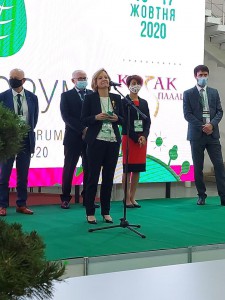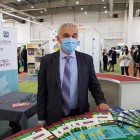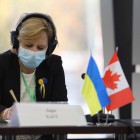The IV International Zaporizhia Environmental Forum “Eco Forum 2020” was co-organized by the Ministry of Environmental Protection and Natural Resources of Ukraine and the Ministry of Education and Science, Zaporizhia City Council, Zaporizhia Regional Administration, Chamber of Commerce, and relevant associations and enterprises of the city and region. A number of technical assistance projects, including PLEDDG, supported the organization of the environmental forum.
At the opening of the event, participants were greeted by Laura Hagg, Chief Governance Adviser at PLEDDG. One of the important issues highlighted by Ms. Laura is the establishment of effective cooperation between local self-government and industrial enterprises in order to prevent harm to the environment and the population.
Panel discussions, a thematic exhibition, sectional meetings, and workshops at the forum were aimed at achieving the main goals:
- raising awareness of climate change, exchanging experience in developing effective climate policies, discussing business opportunities in the field of alternative energy, international experience in implementing climate projects;
- establishing and expanding cooperation in the field of environmental protection and rational use of natural resources between local self-government, experts, industry, and the public;
- presentation of the latest technologies in the field of environmental protection and adaptation to climate change;
- promoting the improvement of the environment through the attraction of investments, the introduction of innovations, and principles of balanced development of territorial communities.
During the sectional meetings during the first day of the forum, PLEDDG experts, in particular, Doug Hickman, Consultant on Environmental Safety, made presentations on existing developments.
Hennadii Marushevskyi, PLEDDG consultant on environmental sustainability presented the contents of the manual Eco-Passport Development for Cities: Methodological Recommendations to the participants of the conference.
The forum featured presentations, workshops, seminars, panel discussions, and specialized sections, as well as the All-Ukrainian competition of scientific papers “Innovative technologies for adaptation of industrial regions to climate change” and a thematic exhibition.
PLEDDG supports the development of municipal cooperation for the reduction of climate risks, and the attraction of investment and innovation to protect the environment. These activities allow cities and their communities to develop in a balanced way and be more confident in a safe and environmentally friendly future.




